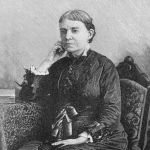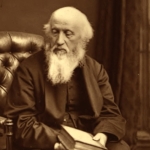One morn I left him in his bed;
A moment after some one said,
‘Your child is dying – he is dead.’
We made him ready for his rest,
Flowers in his hair, and on his breast
His little hands together prest.
So, floating from the world were we,
Apart from sympathy, we Three.
The wild sea moaned, the black clouds spread
Moving shadows on its bed,
But one of us lay midship dead.
I saw his coffin sliding down
The yellow sand in yonder town,
Where I put on my sorrow’s crown.
And we returned; in this drear place
Never to see him face to face,
I thrust aside the living race.
Mothers, who mourn with me today,
Oh, understand me, when I say,
I cannot weep, I cannot pray;
I gaze upon a hidden store,
His books, his toys, the clothes he wore,
And cry, ‘Once more, to me, once more!’
Then take, from me, this simple verse,
That you may know what I rehearse—
A grief – your and my Universe!

















Comment form: